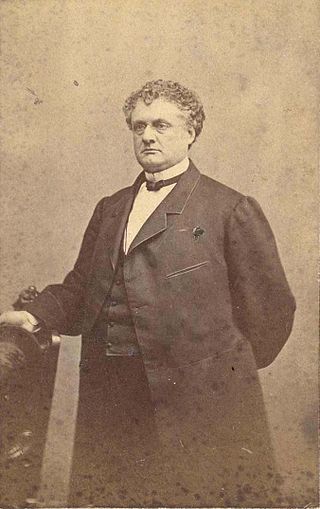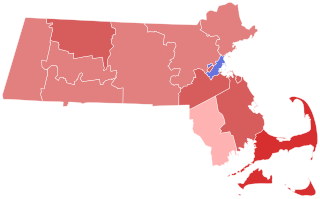Election
| |||||||||||||||||
| |||||||||||||||||
 County results Andrew: 50–60% 60–70% 70–80% 80–90% >90% | |||||||||||||||||
| |||||||||||||||||
The 1863 Massachusetts gubernatorial election was held on November 3.
Contents
Governor John Albion Andrew was re-elected to a fourth term in office over Democrat Henry W. Paine.
| |||||||||||||||||
| |||||||||||||||||
 County results Andrew: 50–60% 60–70% 70–80% 80–90% >90% | |||||||||||||||||
| |||||||||||||||||
| Elections in Massachusetts |
|---|
 |
The 1863 Massachusetts gubernatorial election was held on November 3.
Governor John Albion Andrew was re-elected to a fourth term in office over Democrat Henry W. Paine.
| Party | Candidate | Votes | % | ±% | |
|---|---|---|---|---|---|
| National Union | John Albion Andrew (incumbent) | 70,483 | 70.65% | ||
| Democratic | Henry W. Paine | 29,207 | 29.28% | ||
| Write-in | 77 | 0.08% | |||
| Total votes | 99,767 | 100.00% | |||
| National Union hold | Swing | ||||

The 54th Massachusetts Infantry Regiment was an infantry regiment that saw extensive service in the Union Army during the American Civil War. The unit was the second African-American regiment, following the 1st Kansas Colored Volunteer Infantry Regiment, organized in the Northern states during the Civil War. Authorized by the Emancipation Proclamation, the regiment consisted of African-American enlisted men commanded by white officers.

Robert Treat Paine was a lawyer, politician and Founding Father of the United States who signed the Continental Association and Declaration of Independence as a representative of Massachusetts. He served as the state's first attorney general and as an associate justice of the Massachusetts Supreme Judicial Court, the state's highest court.
The Radical Republicans were a faction within the Republican Party originating from the party's founding in 1854—some six years before the Civil War—until the Compromise of 1877, which effectively ended Reconstruction. They called themselves "Radicals" because of their goal of immediate, complete, and permanent eradication of slavery in the United States. They were opposed during the war by the Moderate Republicans, and by the Democratic Party. Radicals led efforts after the war to establish civil rights for former slaves and fully implement emancipation. After unsuccessful measures in 1866 resulted in violence against former slaves in the rebel states, Radicals pushed the Fourteenth Amendment for statutory protections through Congress. They opposed allowing ex-Confederate officers to retake political power in the Southern U.S., and emphasized equality, civil rights and voting rights for the "freedmen", i.e., former slaves who had been freed during or after the Civil War by the Emancipation Proclamation and the Thirteenth Amendment.

The Boston Brahmins or Boston elite are members of Boston's traditional upper class. They are often associated with a cultivated New England or Mid-Atlantic dialect and accent, Harvard University, Anglicanism, and traditional British American customs and clothing. Descendants of the earliest English colonists are typically considered to be the most representative of the Boston Brahmins. They are considered White Anglo-Saxon Protestants (WASPs).

John Albion Andrew was an American lawyer and politician from Massachusetts. He was elected in 1860 as the 25th Governor of Massachusetts, serving between 1861 and 1866, and led the state's contributions to the Union cause during the American Civil War (1861-1865). He was a guiding force behind the creation of some of the first African-American units in the United States Army, including the 54th Massachusetts Infantry. He belonged to the Whig, Free Soil, and Republican parties during his career.

The Commonwealth of Massachusetts played a significant role in national events prior to and during the American Civil War (1861–1865). Massachusetts dominated the early antislavery movement during the 1830s, motivating activists across the nation. This, in turn, increased sectionalism in the North and South, one of the factors that led to the war. Politicians from Massachusetts, echoing the views of social activists, further increased national tensions. The state was dominated by the Republican Party and was also home to many Radical Republican leaders who promoted harsh treatment of slave owners and, later, the former civilian leaders of the Confederate States of America and the military officers in the Confederate States Army.
The Massachusetts Republican Party (MassGOP) is the Massachusetts branch of the U.S. Republican Party.

John Quincy Adams II was an American politician who represented Quincy in the Massachusetts House of Representatives from 1866 to 1867, 1868 to 1869, 1871 to 1872, and from 1874 to 1875.

Charles Jackson Paine was an American railroad executive, soldier, and yachtsman who was a general in the Union Army during the American Civil War.

The 1940 United States Senate election in Massachusetts was held on November 5, 1940, with Democratic incumbent David I. Walsh defeating his challengers.

The United States Senate election of 1942 in Massachusetts was held on November 3, 1942. Republican incumbent Henry Cabot Lodge Jr. was re-elected to a second term in office over Democratic U.S. Representative Joseph E. Casey.
Horatio Gates Herrick was an American lawyer who served as sheriff of Essex County, Massachusetts.

The 83rd Massachusetts General Court, consisting of the Massachusetts Senate and the Massachusetts House of Representatives, met in 1862 during the governorship of John Albion Andrew. John Henry Clifford served as president of the Senate and Alexander Hamilton Bullock served as speaker of the House.
The 84th Massachusetts General Court, consisting of the Massachusetts Senate and the Massachusetts House of Representatives, met in 1863 during the governorship of John Albion Andrew. Jonathan E. Field served as president of the Senate and Alexander Hamilton Bullock served as speaker of the House.

The 1857 Massachusetts gubernatorial election was held on November 3. Incumbent Know-Nothing Governor Henry J. Gardner ran for a fourth term in office, but lost the support of the Republican Party, which nominated Speaker of the United States House of Representatives Nathaniel P. Banks. Banks prevailed over Gardner to become the first Republican Governor of Massachusetts.
The 1860 Massachusetts gubernatorial election was held on November 6. Incumbent Republican Governor Nathaniel Banks did not run for re-election to a fourth term. He was succeeded by Republican John Albion Andrew, a radical abolitionist.

The 1867 Massachusetts gubernatorial election was held on November 5.

The 1864 Massachusetts gubernatorial election was held on November 8.
The 1862 Massachusetts gubernatorial election was held on November 4.
The 1861 Massachusetts gubernatorial election was held on November 5.